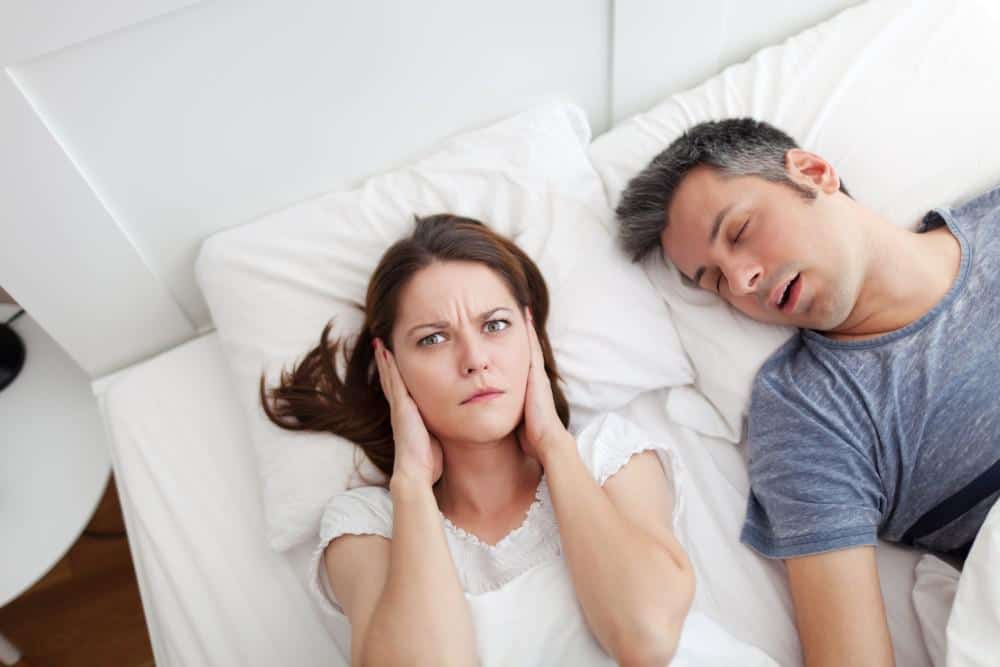You Could Have Sleep Apnea and Not Know It

Home > Blog > You Could Have Sleep Apnea and Not Know It
You Could Have Sleep Apnea and Not Know It
Sleep apnea basics
Snoring happens when air can’t move freely through your nose and throat during sleep. As the air forces its way through, the surrounding tissue vibrates and creates the signature snore sound.
Obstructive sleep apnea occurs when air isn’t just restricted, but totally blocked. When the tissues that support your tongue or the tongue itself relaxes in your sleep, it can end up blocking your airway.
When your brain realizes your breathing is totally blocked, it wakes you up just long enough to manually breathe. You wake up and gasp for air, but only for a moment. The interruption of your sleep is so quick that most people never fully wake up.
Patients with mild sleep apnea wake up 5-15 times per hour. In some severe cases, patients wake up 30 times per hour, which equates to roughly every two minutes.
Major sleep apnea symptoms
When you wake up every few minutes, restful sleep is disrupted and REM sleep is basically impossible. Beyond fully waking up during a bout of sleep apnea, drowsiness and fatigue are the most obvious signs of obstructive sleep apnea.
The consequences of these symptoms can be dangerous; Mayo Clinic reports that apnea sufferers are more likely to be involved in accidents in the car or the workplace.
Fatigue can also mess with your emotions. If you find yourself more irritable, depressed, or short-tempered, sleep apnea may be to blame.
Sleep apnea can also do serious damage to your heart. When your body isn’t able to breathe, your blood oxygen level drops. In reaction to this, your blood pressure spikes to keep oxygenating your tissues and organs.
Now, imagine this same process happening around or exceeding 50 times a night. It’s no wonder that high blood pressure, recurrent heart attack, stroke, and abnormal heartbeat are all associated with sleep apnea.
Diagnosis
The first step towards diagnosis may come from your family. Your partner or others in the house may often hear a cycle of loud snoring, then silence when you stop breathing, followed by a sudden gasp when you start breathing again.
When you visit Dr. Gergits, he will set up a sleep study, the only foolproof way to diagnose sleep apnea. During a sleep study, you wear sensors that measure your breathing, air flow, and oxygen levels while you sleep. The information recorded shows whether you stop breathing and how often.
Treatment
For those with mild sleep apnea, weight loss may be able to cure sleep apnea by putting less weight on the soft palate and neck area.
More severe cases of sleep apnea are treated using a continuous positive airway pressure machine, or CPAP. This mask uses continuous pressure to keep your throat open throughout the night and ensures proper airflow.
Dr. Gergits could also prescribe a mouthguard-like oral appliance that you’ll wear when you sleep. This device prevents your tongue from sliding back and blocking your airways, giving you that peaceful, uninterrupted night of sleep you deserve.
Don’t let obstructive sleep apnea keep you from a good night’s sleep. Dr. Gergits can help you overcome this disorder and will have you sleeping like a rock in no time. Call or schedule an appointment at our Scottsdale and Fountain Hills, Arizona office today.
Disclaimer:
The information provided in this article is for informational and educational purposes only and does not constitute medical advice. It is not intended to diagnose, treat, cure, or prevent any disease or medical condition. Always seek the guidance of your physician or other qualified healthcare provider with any questions you may have regarding a medical condition or treatment.
Results may vary: Treatment outcomes and health experiences may differ based on individual medical history, condition severity, and response to care.
Emergency Notice: If you are experiencing a medical emergency, call 911 or seek immediate medical attention.



